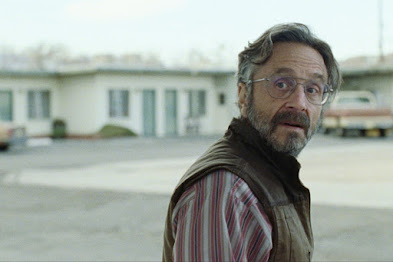“To Leslie” picks up six years later with Leslie destitute and evicted from the grimy motel where she has been living, begging her fellow tenants for money and then excoriating them when they won’t cough it up, a swift evocation of her tendency to alienate everyone in her orbit. That includes her estranged son James (Owen Teague). He welcomes her in but always appears to be looking at her out of the side of his eye even when looking at her right in the face, warning her she can only stay with him if she does not pick up a bottle. “Baby, I don’t drink no more,” Leslie says, and the way Riseborough has her say it is something less than agony to get things right than pure wickedness. As soon as he’s out of the house, she goes rifles through his drawers looking for a money, and when his neighbors down the hall have her over for a drink, an enraged James assaults them. The fight, though remains fuzzy in the background as Morris maintains focus on Leslie in the foreground, visually highlighting the messes she leaves trailing in her wake.
She moves on to her hometown, briefly holing up with a couple one-time friends (Alison Janney and Stephen Root) who treat her more like an enemy, not encouraging but almost mocking, taunting, letting her into their homes but turning their backs. It’s this pointed lack of family, emotional or otherwise, that sends her back to the bar over and over, like the scene where she flirts with a rancher (Scott Subiono) just passing through town. This sequence could have gone the way of a sequence in Charlize Theron’s “Young Adult” or a thousand other pictures, but becomes something else instead, the thumping bass of Waylon Jennings’s “Are You Sure Hank Done It This Way” becoming the suspenseful incantation of a horror movie as Leslie pulls the reluctant rancher onto the dance floor and he delicately tries without setting her off to extricate himself from the situation, saying “Be well” in a voice so earnest and well-meaning that Leslie only becomes disgusted by it.
That moment of emotional generosity, the one she’s not willing to hear, foreshadows Leslie’s emergent relationship with Sweeney who at first chases her off his motel property for sleeping off her drunken revelry there and then gives her a job as a maid with a room to stay in. Sweeney has a backstory that fills out this generosity but it’s already accounted for in Maron’s air, halting and hesitant, struggling to make eye contact with Leslie at first, understanding his actions probably won’t go well but knowing it’s the right thing to do. Maron’s down to earth countenance plays off Riseborough’s aggressive self-persecution perfectly, and for the most part, Morris is content not to rush this gentle rhythm of someone helping someone else get back on her feet. That makes it all the more disappointing as the movie gradually slides toward conventionality, Leslie and Sweeney attending a dance together where mutual attraction blooms even as the locals condescend to her, and a decrepit old diner becomes a beacon of hope. The immense work it would take to get this diner up and running is all off screen, a little too magical, though then again, there is almost no natural way for this story to end. If it’s all about one day at a time, it’s in each of them that “To Leslie” finds the truth.





No comments:
Post a Comment